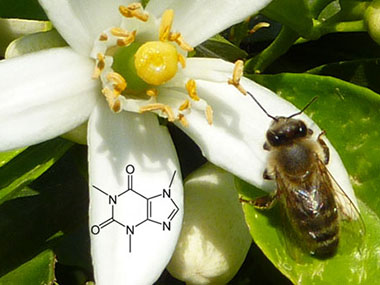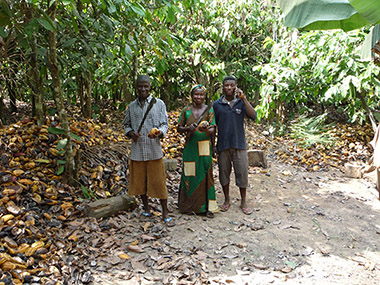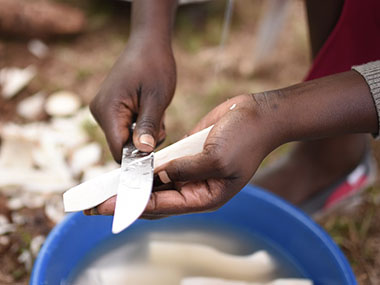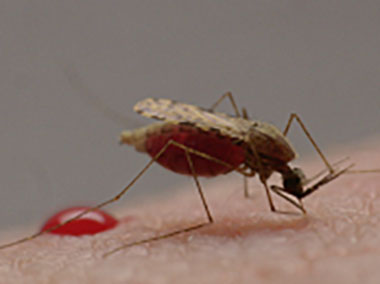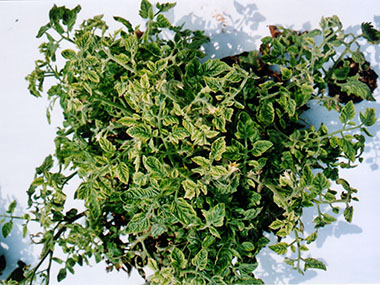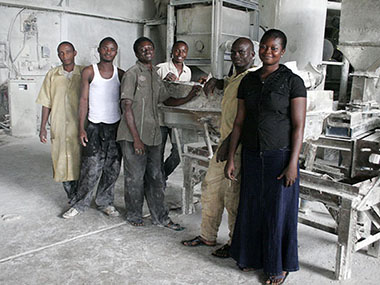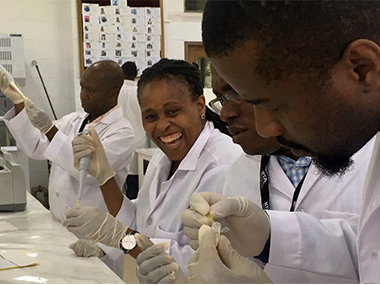Ecosystem Services
Ecosystem Services Research Group priorities 2021-2026
Agricultural production is both dependent upon ecosystem services both to sustain productivity but also has negative and positive impacts on the ecosystem services that support that productivity and the support systems that maintain life on earth. At crop level ecosystem processes need to be managed to maximise productivity, but the cropping system must also be designed to sustain future productivity and ecosystem services to life support systems. Nevertheless, there will be trade-offs and potentially synergies between the immediate needs for provisioning ecosystem services and sustaining regulatory and supporting ecosystem services for the longer-term benefit of humanity and life on earth. Thus the research priorities fall across three complementary areas of work:
- PRODUCTIVITY: Determine the processes and identify responses to abiotic and biotic factors limiting crop productivity (e.g. soil fertility, climate variability, weeds, pests, parasites and pollinators)
- SUSTAINABILITY: Identify the attributes and processes that contribute to sustainable productivity in agricultural systems such as soil improving cropping systems, agroforestry, perennial crops (e.g. vineyards, coffee plantations) and home gardens (e.g. enset)
- TRADE-OFFS: Quantification of the environmental performance (including resource use intensity and ecosystem services provision) of agricultural production systems and trade-offs with socioeconomic benefits at farm, landscape, national and global scales.
Projects and research areas of the Ecosystem Services Research Group:
Productivity
- Parasitic weed management in staple crops in Africa
- Weeds of the future: Vulpia myuros
- Rediscovering Coffee in Sierra Leone
Sustainability
- Sustainability of Coffee Agroforestry in Central America
- Sustainable Agricultural Intensification: agronomic approaches for smallholders in the south
- Enset Agrisystems in Ethiopia
- Soil multifunctionality
Trade-offs
Current PhD projects at NRI
- Muhammad Umar: Towards a typology of agricultural value chain system shocks and resilience measures / supervisors: Conor Walsh (NRI), Alessandro de Pinto (NRI), Jeremy Haggar (NRI) / 2021-2023
- Jacinta Nyaika: Preharvest influences on postharvest safety and quality of traditional cassava products in Malawi, prospects for adaptation and mitigation / supervisors: Louise Abayomi (NRI), Lucie Büchi (NRI), Onoriode Coast (NRI) / 2021-2023
- Rachel R Chase: Characterisation of enset functional traits, genetics and optimal management practices to enhance food security and climate resilience in Ethiopia / supervisors: Lucie Büchi (NRI), Jonne Rodenburg (NRI), James Borrell (RBG Kew) / 2020-2023
- Immaculate M Mwangangi: Innovative fertiliser solutions to combat Striga on smallholder sorghum farms in Africa / supervisors: Jonne Rodenburg (NRI), Lucie Büchi (NRI), Stephan Haefele (Rothamsted Research) / 2020-2022
- Menyene U Ekanem: Farmers’ perception of the impact of climate change on the four dimensions of food security (food availability, accessibility, utilisation and food system stability) in Akwa Ibom State, Nigeria / supervisors: Peter Burt (NRI), John F Morton (NRI) / 2019-2022
Current PhD projects at other institutions
- Jane Mwangi: Assessment of environmental and anthropogenic factors influencing spatial distribution of Osyris lanceolata (Hochst &Steud) in Arid and Semi-Arid parts of Kenya / supervisors: Salisu Mohammed (Bayero University), Kabir Mustapha Umar (Bayero University), Jeremy Haggar (NRI), Truly Santika (NRI) / 2020-2024
- Guy Marius Assogba (Wageningen University): Crop management solutions against Striga asiatica in maize cropping systems / supervisors: Lammert Bastiaans (Wageningen University), Jonne Rodenburg (NRI) / 2017-2022
- Cyprian Mwale (Wageningen University): Integrated rice and natural resources management in African wetlands / supervisors: Ken Giller (Wageningen University), Gerrie van de Ven (Wageningen University), Jonne Rodenburg (NRI) / 2015-2022
Past PhD projects at NRI
- Jane Robb: Decision-making processes and drivers of land use change in a REDD+ context / supervisors: Jeremy Haggar (NRI), Richard Lamboll (NRI) / 2014-2017
- Elsa Gudmunsdottir: Market incentives for biodiversity conservation in Central America / supervisors: Jeremy Haggar (NRI), Julian Quan (NRI) / 2014-2017
- Hannah Scott: Investigations into the structural features of pyrolysed organic carbon as a cause for changes in crop and soil agronomy / supervisors: Jeremy Haggar (NRI), John Orchard (NRI) / 2013-2016
- John Pattison: The effectiveness of social and agricultural policies for increasing household food security in biodiversity hotspots in India / supervisors: Jeremy Haggar (NRI), John Morton (NRI) / 2013-2016
- Wahira Othman: Understanding mangrove forest social ecological systems to develop options for sustainable management in Zanzibar, Tanzania / supervisors: Tim Chancellor (NRI), Richard Lamboll (NRI) / completed 2014
2021
- Büchi, L., Cordeau, S., Hull, R., Rodenburg, J., 2021. Vulpia myuros, an increasing threat for agriculture. Weed Research 61, 13-24, doi: 10.1111/wre.12456
- Cerretelli S., Poggio L., Yakob G., Boke S., Habte M., Coull M., Peressotti A., Black H., and Gimona A., 2021. The advantages and limitations of global datasets to assess carbon stocks as proxy for land degradation in an Ethiopian case study. Geoderma, 399, 115117. https://doi.org/10.1016/j.geoderma.2021.115117
- Davis AP, Mieulet D, Moat J, Sarmu D, Haggar J (2021) Arabica-like flavour in a heat-tolerant wild coffee species. Nature Plants 7: 413-418, doi.org/10.1038/s41477-021-00891-4
- Haggar J., Casanoves F., Cerda R., Cerretelli S., Gonzalez-Mollinedo S., Lanza G., Lopez E., Leiva B., and Ospina A., 2021. Shade and Agronomic Intensification in Coffee Agroforestry Systems: Trade-Off or Synergy? Frontiers in Sustainable Food Systems, 5, pp: 1-14. https://doi.org/10.3389/fsufs.2021.645958
- Haggar J. Gracioli C., Springate S. (2021) Land sparing or sharing: strategies for conservation of arable plant diversity. Journal for Nature Conservation https://doi.org/10.1016/j.jnc.2021.125986
- Haggar J., Rodenburg J. (2021) Lessons on enabling African smallholder farmers, especially women and youth, to benefit from Sustainable Agricultural Intensification. International Journal of Agricultural Sustainability https://doi.org/10.1080/14735903.2021.1898179
- Lara-Estrada, L., Rasche, L., & Schneider, U. A. 2021. Land in Central America will become less suitable for coffee cultivation under climate change. Regional Environmental Change, 21(3), 88. https://doi.org/10.1007/s10113-021-01803-0
- Santika, T., Wilson, K.A., Law, E.A., St John, F.A.V., Carlson, K.M., Gibbs, H., Morgans, CL., Ancrenaz, M., Meijaard, E. & Struebig, M.J. (2021) Impact of palm oil sustainability certification on village well-being and poverty in Indonesia. Nature Sustainability 4, 109-119 (https://doi.org/10.1038/s***********0630-1).
2020
- Laurance, W.F., Wich, S.A., Onrizal, O., Fredriksson, G., Usher, G., Santika, T., Byler, D., Mittermeier, R., Kormos, R., Williamson, E.A. and Meijaard, E., 2020. Tapanuli orangutan endangered by Sumatran hydropower scheme. Nature Ecology and Evolution 4, 1438-1439 (https://doi.org/10.1038/s41559-020-1263-x).
- Masters-Clark, E., Shone, E., Paradelo, M., Hirsch, P.R., Clark, I.M., Otten, W., Brennan, F. & Mauchline, T.H. 2020. Development of a defined compost system for the study of plant-microbe interactions. Scientific Reports, 10, 7521.
- Rodenburg, J., Büchi, L., Haggar, J., 2020. Adoption by adaptation: moving from Conservation Agriculture to Conservation Practices. International Journal of Agricultural Sustainability, doi: 10.1080/14735903.2020.1785734
- Santika, T., Budiharta, S., Law, E.A., Dennis, R.A., Dohong, A., Struebig, M.J., Gunawan, H., Meijaard, E. & Wilson, K.A. (2020) Interannual climate variation, land type and village livelihood effects on fires in Kalimantan, Indonesia. Global Environmental Change 64, 102129 (https://doi.org/10.1016/j.gloenvcha.2020.102129).
2019
- Banerjee, S., Walder, F., Büchi, L., Meyer, M., Held, A.Y., Gattinger, A., Keller, T., Charles, R., van der Heijden, M., 2019. Agricultural intensification reduces microbial network complexity and the abundance of keystone taxa in roots. The ISME Journal https://doi.org/10.1038/s41396-019-0383-2
- Coast O, Shah S, Ivakov A, Gaju O, Wilson PB, Posch BC, Bryant CJ, Negrini ACA, Evans JR, Condon AG, Silva‐Pérez V, Reynolds MP, Pogson BJ, Millar AH, Furbank RT, Atkin OK (2019). Predicting dark respiration rates of wheat leaves from hyperspectral reflectance. Plant Cell & Environment 42: 2133-2150 https://doi.org/10.1111/pce.13544
- Haggar J, Pons D, Saenz L, Vides J (2019) Contribution of agroforestry systems to sustaining biodiversity in fragmented forest landscapes. Agriculture Ecosystems and Environment: 283 106567 https://doi.org/10.1016/j.agee.2019.06.006
- Robb J, Haggar J, Lamboll R, Castellanos E (2019) Exploring the value-action gap through shared values, capabilities and deforestation behaviours in Guatemala. Environmental Conservation https://doi.org/10.1017/S0376892919000067
- Santika, T., Wilson, K.A., Budiharta, S., Law, E.A., Poh, T.M., Ancrenaz, M., Struebig, M.J. & Meijaard, E. (2019) Does oil palm agriculture help alleviate poverty? A multidimensional counterfactual assessment of oil palm development in Indonesia. World Development 120, 105-117 (https://doi.org/10.1016/j.worlddev.2019.04.012).
- Santika, T., Wilson, K.A., Budiharta, S., Kusworo, A., Meijaard, E., Law, E.A., Friedman, R., Hutabarat, J.A., Indrawan, T.P., St. John, F.A. & Struebig, M.J. (2019) Heterogeneous impacts of community forestry on forest conservation and poverty alleviation: Evidence from Indonesia. People and Nature 1, 204-219 (https://doi.org/10.1002/pan3.25).
2018
- Cerretelli S., Poggio L., Gimona A., Yakob G., Boke S., Habte M., Peressotti A., and Black H., 2018. Spatial assessment of land degradation through key ecosystem services: The role of globally available data. Science of the Total Environment, 628-629, pp: 539-555. https://doi.org/10.1016/j.scitotenv.2018.02.085
- Lara-Estrada L., Rasche L., Sucar L.E., & Schneider U.A. 2018. Inferring Missing Climate Data for Agricultural Planning Using Bayesian Networks. Land, 7(1), 4. https://doi.org/10.3390/land7010004
- Soto-Gómez, D., Pérez-Rodríguez, P., Vázquez-Juiz, L., López-Periago, J.E. & Paradelo, M. 2018. Linking pore network characteristics extracted from CT images to the transport of solute and colloid tracers in soils under different tillage managements. Soil and Tillage Research, 177.
2017
- Büchi, L., Wendling, M., Amossé, C., Jeangros, B., Sinaj, S., Charles, R., 2017. Long and short term changes in crop yield and soil properties induced by the reduction of soil tillage in a long term field experiment in Switzerland. Soil and Tillage Research 174:120-129.
- Lara-Estrada L., Rasche L., and Schneider U.A. 2017. Modeling land suitability for Coffea arabica L. in Central America. Environmental Modelling & Software, 95, 196–209. https://doi.org/10.1016/j.envsoft.2017.06.028
- Rodenburg, J., Cissoko, Mamadou, Kayongo, Nicholas, Dieng, Ibnou, Bisikwa, Jenipher, Irakiza, Runyambo, Masoka, Isaac, Midega, Charles A. O. and Scholes, Julie D. (2017) Genetic variation and host-parasite specificity of Striga resistance and tolerance in rice: the need for predictive breeding. New Phytologist, 214: 1267-1280. https://doi.org/10.1111/nph.14451
- Wendling, M., Büchi, L., Amossé, C., Jeangros, B., Walter, A., Charles, R., 2017. Specific interactions leading to transgressive overyielding in cover crop mixtures. Agriculture, Ecosystems and Environment 241:88-99.
2016
- Büchi, L., Vuilleumier, S., 2016. Ecological strategies in stable and disturbed environments depend on species specialisation. Oikos 125(10):1408-1420.
- Coast O, Murdoch AJ, Ellis RH,Hay FR and Jagadish SVK (2016). Resilience of rice (Oryza spp.) pollen germination and tube growth to temperature stress. Plant, Cell & Environment 39: 26-37 https://doi.org/10.1111/pce.12475
- Paradelo, M., Katuwal, S., Moldrup, P., Norgaard, T., Herath, L. & de Jonge, L.W. 2016. X-ray CT-derived soil characteristics explain varying air, water, and solute transport properties across a loamy field. Vadose Zone Journal, 15.
- Paradelo, M., Katuwal, S., Moldrup, P., Norgaard, T., Herath, L. & de Jonge, L.W. 2016. X-ray CT-derived soil characteristics explain varying air, water, and solute transport properties across a loamy field. Vadose Zone Journal, 15.
- Rodenburg, J., Demont, Matty, Zwart, Sander J. and Bastiaans, Lammert (2016) Parasitic weed incidence and related economic losses in rice in Africa. Agriculture, Ecosystems and Environment, 235: 306-317. https://doi.org/10.1016/j.agee.2016.10.020)
2014
- Büchi, L., Vuilleumier, S., 2014. Coexistence of specialist and generalist species is shaped by dispersal and environmental factors. The American Naturalist 183(5):612-24.
- Rodenburg, J., Cissoko, Mamadou, Kayeke, Juma, Dieng, Ibnou, Khan, Zeyaur R., Midega, Charles A.O., Onyuka, Enos A. and Scholes, Julie D. (2014) Do NERICA rice cultivars express resistance to Striga hermonthica (Del.) Benth. and Striga asiatica (L.) Kuntze under field conditions? Field Crops Research, 170: 83-94. https://doi.org/10.1016/j.fcr.2014.10.010
- Schut, Marc, Klerkx, Laurens, Rodenburg, J., Kayeke, Juma, Hinnou, Léonard C., Raboanarielina, Cara M., Adegbola, Patrice Y., van Ast, Aad and Bastiaans, Lammert (2014) RAAIS: Rapid Appraisal of Agricultural Innovation Systems (Part I). A diagnostic tool for integrated analysis of complex problems and innovation capacity. Agricultural Systems, 132: 1-11. https://doi.org/10.1016/j.agsy.2014.08.009


